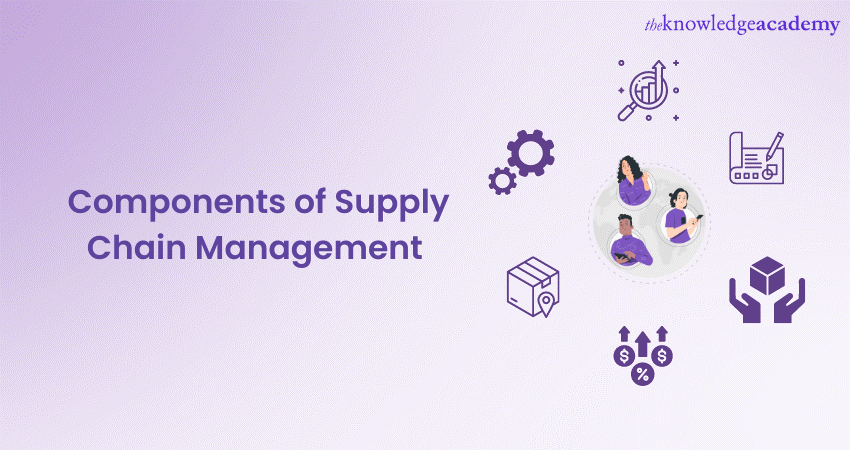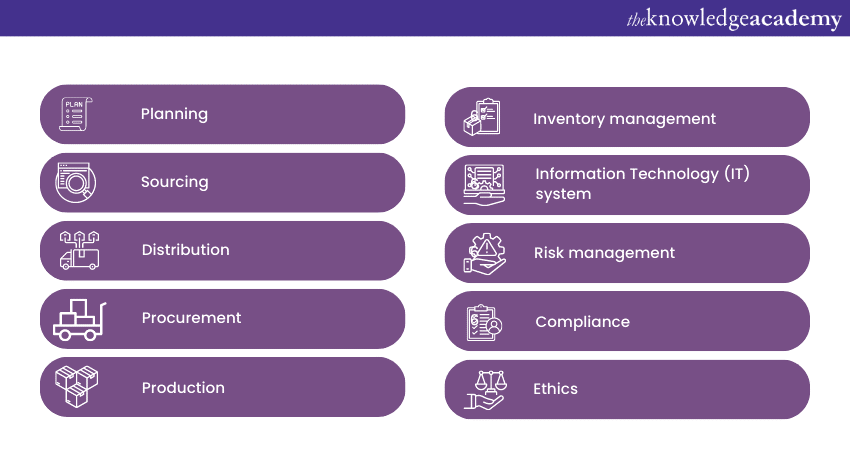We may not have the course you’re looking for. If you enquire or give us a call on 01344203999 and speak to our training experts, we may still be able to help with your training requirements.
Training Outcomes Within Your Budget!
We ensure quality, budget-alignment, and timely delivery by our expert instructors.

While businesses across the world grow rapidly, it is essential to make sure that goods and services are supplied to customers hassle-free. The Supply Chain plays an important role in achieving this feat. Understanding how a Supply Chain works is the first step in growing your business. The Components of Supply Chain Management ensure that everything works well collectively.
The expanding market for Supply Chain Management (SCM) shows the significance of SCM in the procurement process. Dive into the essential Components of Supply Chain Management that play a crucial role in achieving smooth and efficient operations.
Table of Contents
1) What is Supply Chain Management?
2) Components of Supply Chain Management
a) Planning
b) Sourcing
c) Distribution
d) Procurement
e) Production
f) Inventory Management
g) Information Technology (IT) Systems
h) Risk Management
i) Compliance
j) Ethics
3) Conclusion
What is Supply Chain Management?
Supply Chain Management is the strategic coordination of all activities involved in the production, procurement, and distribution of goods or services. It aims to streamline the flow of materials, information, and finances from suppliers to manufacturers to retailers and ultimately to consumers.
The goal is to bring efficiency, minimise costs, and improve customer satisfaction. It is done by ensuring that the right products are available at the right place and time.

Why is Supply Chain Management important?
Supply Chain Management is important as it ensures smooth coordination of all activities involved in delivering goods or services to customers. Effective Supply Chain Management minimises inventory and transportation costs while improving customer service.
With global Supply Chains, it allows access to a wider range of suppliers and markets. By managing risks and disruptions, it ensures continuity. Ultimately, Supply Chain Management contributes to profitability, customer satisfaction, and a competitive edge in the dynamic business landscape.
Components of Supply Chain Management
Here we discuss the main Components of Supply Chain Management which is essential for your successful business venture.

Planning
Planning serves as the foundational component of Supply Chain Management. It supports the development of logical strategy, forecasting, and demand management. Through this, organisations can operate well and reduce unnecessary costs. In planning, forecasts are crucial for anticipating future demand and adjusting production and inventory levels. It ensures that the right products are available in the right quantities when customers require them.
Sourcing
Sourcing is crucial for identifying and selecting suppliers who can provide the necessary raw materials, components, or finished products. It is taken into consideration so that businesses can meet the market demand. Evaluating potential suppliers based on quality, reliability, and cost ensures that the Supply Chain operates smoothly.
Distribution
The distribution component, integral to the overall supply chain, ensures that finished products reach end customers in a timely and cost-effective manner. This stage involves not only selecting appropriate transportation methods and establishing distribution centers but also intricately managing logistics through strategic logistic management. Logistic management in distribution encompasses tasks such as optimizing routes, coordinating transportation, and efficiently managing inventory levels. By implementing effective logistic management strategies within distribution networks, organizations can achieve faster order fulfillment, reduce operational costs, and enhance overall customer service.
Develop your skills in Logistics Management through our Logistics Management Training Course. Register today!
Procurement
Procurement involves the actual process of purchasing goods and services from suppliers. This component focuses on negotiating contracts, managing supplier relationships, and ensuring timely delivery of materials. An efficient procurement system contributes to cost savings and minimises disruptions in the Supply Chain.
Production
Procurement is the process of purchasing goods and services from suppliers. It involves negotiating contracts, managing supplier relationships, and controlling costs. Tactical procurement practices can lead to cost savings, reduced lead times, and improved quality of materials. It improves the overall Supply Chain performance.
Inventory management
Managing inventory is essential for balancing supply and demand. Maintaining the right level of inventory prevents stockouts or overstocking, which can lead to financial losses and decreased customer satisfaction. Inventory management systems utilise techniques like Just-in-Time (JIT) and Economic Order Quantity (EOQ) to optimise stock levels.
Information Technology (IT) systems
In modern Supply Chain trends, technology plays a vital role in connecting various components. IT systems facilitate real-time tracking, data analysis, and communication across the Supply Chain. The system's scalability makes sure that the company can easily accommodate fluctuations in the market and scale up or down as needed. It also enhances transparency and decision-making capabilities.
Risk management
Supply Chains are vulnerable to various risks such as disruptions in supply, natural disasters, or geopolitical challenges. Implementing risk management strategies and contingency plans safeguards the Supply Chain from unforeseen events. These strategies may involve diversifying suppliers, establishing backup production facilities, or securing alternative transportation routes. It ensures continuity in operations without many delays.
Compliance
Compliance is a critical component of every Supply Chain Management that focuses on maintaining product integrity and adhering to regulatory standards. In the context of a food processing company, it involves conducting regular inspections and lab tests to ensure that all products meet stringent safety guidelines. These measures help prevent the occurrence of contaminated or substandard products in the market. It safeguards consumer health and preserves the company's reputation.
Unlock your compliance potential Export And Trade Compliance Training Course. Sign up now!
Ethics
Ethical practices in Supply Chain Management consider the environmental and social impacts of business operations. Companies make sure that workers in their Supply Chain are treated fairly, paid living wages, and work in safe and humane conditions. By prioritising these principles, businesses contribute to a more sustainable and equitable future while resonating with increasingly conscientious consumers.
Conclusion
The Supply Chain Management system comprises several interlinked components that work in tandem to deliver products and services to customers effectively. Understanding the Components of Supply Chain Management and their significance is essential for businesses looking to optimise their Supply Chain operations. It is a great tool to improve customer satisfaction and gain a competitive edge in the market.
Elevate your Supply Chain knowledge with our Supply Chain Management Training Course. Join now!
Frequently Asked Questions
Upcoming Business Skills Resources Batches & Dates
Date
 Supply Chain Management Training
Supply Chain Management Training
Fri 7th Jun 2024
Fri 6th Sep 2024
Fri 6th Dec 2024







 Top Rated Course
Top Rated Course


 If you wish to make any changes to your course, please
If you wish to make any changes to your course, please


